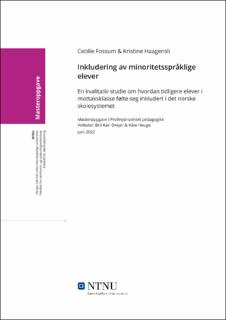| dc.contributor.advisor | Drejer, Brit Kari | |
| dc.contributor.advisor | Hauge, Kåre | |
| dc.contributor.author | Fossum, Cecilie | |
| dc.contributor.author | Haagensli, Kristine | |
| dc.date.accessioned | 2022-09-06T17:19:47Z | |
| dc.date.available | 2022-09-06T17:19:47Z | |
| dc.date.issued | 2022 | |
| dc.identifier | no.ntnu:inspera:112400045:37508907 | |
| dc.identifier.uri | https://hdl.handle.net/11250/3016093 | |
| dc.description.abstract | I det norske samfunnet i dag bor det nær 820 000 innvandrere (Statistisk Sentralbyrå, 2022), og blant disse er mange barn. Noen av disse barna er født i Norge og har foreldre med innvandrerbakgrunn, mens andre kommer til landet i skolealder. Barna som kommer til Norge i skolealder og ikke kan norsk, kan bli plassert i en mottaksklasse. Temaet for prosjektet er inkludering av minoritetsspråklige elever i det norske skolesystemet, både i mottaksklasse og overgangen til ordinær klasse. Vår problemstilling er: Hvordan opplevde tidligere elever i mottaksklasse å bli inkludert i det norske skolesystemet?
Oppgavens teorigrunnlag er satt sammen av relevant litteratur innenfor hovedtema inkludering. Det teoretiske rammeverket inneholder flere mindre tema som er nøye utvalgt etter datamaterialets essens, samt viktige styringsdokumenter og lovverk for inkludering i skolen. Vi har gjort en kvalitativ studie hvor vi har intervjuet fire informanter med minoritetsspråklig bakgrunn. Alle disse har tidligere gått i mottaksklasse. Den innsamlede empirien og vårt teoretiske rammeverk har vært grunnlaget for analysen. Slik det fremgår i problemstillingen, at informantene er tidligere elever, er det et retrospektiv som undersøkes.
De mest sentrale funnene vi gjorde i vårt forskningsprosjekt var blant annet at lek og vennskap var viktig for informantene i deres inkluderingsprosess i det norske skolesystemet. Læreren hadde en betydningsfull rolle i det å tilrettelegge for inkluderende fellesskap og var sammen med språket viktige faktorer på å ta del av det inkluderende klassefellesskapet. Noe som var interessant i våre funn var at informantene påpekte at man må være mottakelig for inkludering for å bli inkludert. Vårt utvalg opplevde tiden i mottaksklasse som en god start på deres første møte med Norge og det norske skolesystemet, samtidig som de møtte på noen utfordringer rundt andregjøring som skapte “oss” og “de andre”. | |
| dc.description.abstract | In today's Norwegian community lives almost 820 000 immigrants (Statistisk Sentralbyrå, 2022), and among these are many children. Some of these children are born in Norway and have parents with immigrant backgrounds, while others move to Norway at school age. The children that move here at school age and can't speak norwegian can be placed in a refugee class. Our project's theme is inclusion of immigrant students in the Norwegian school system, both in a refugee class and in the transition to an ordinary class. Our research problem is: How did former students of a refugee class experience inclusion in the Norwegian school system?
The project's theoretical basis is put together with relevant literature within the main theme inclusion. The theoretical framework contains several smaller themes which are closely chosen from the essence of our data material, in addition to important managed documents and the Norwegian law for inclusion in the school system. We have completed a qualitative study and held interviews with four informants with an immigrant background. All of them went to a refugee class. The collected empiricism and our theoretical framework has been the basis for the analysis. As it appears in our research problem, that the informants were former students, it is a retrospective study.
The most central findings we made in our research project were, among other things, that games and friendship were important for the informants in their inclusion process in the Norwegian school system. The teacher had a significant role when it came to creating an inclusive community and, together with the language, were important factors in taking part in the inclusive class community. What was interesting in our findings was that the informants pointed out that one must be receptive to inclusion to be included. Our selection of informants experienced the time in refugee class as a good start to their first encounter with Norway and the Norwegian school system, but at the same time they encountered some challenges around othering that created "us" and "the others". | |
| dc.language | nob | |
| dc.publisher | NTNU | |
| dc.title | Inkludering av minoritetsspråklige elever | |
| dc.type | Master thesis | |
